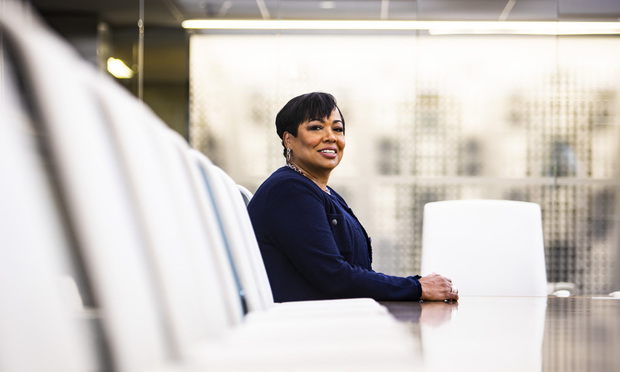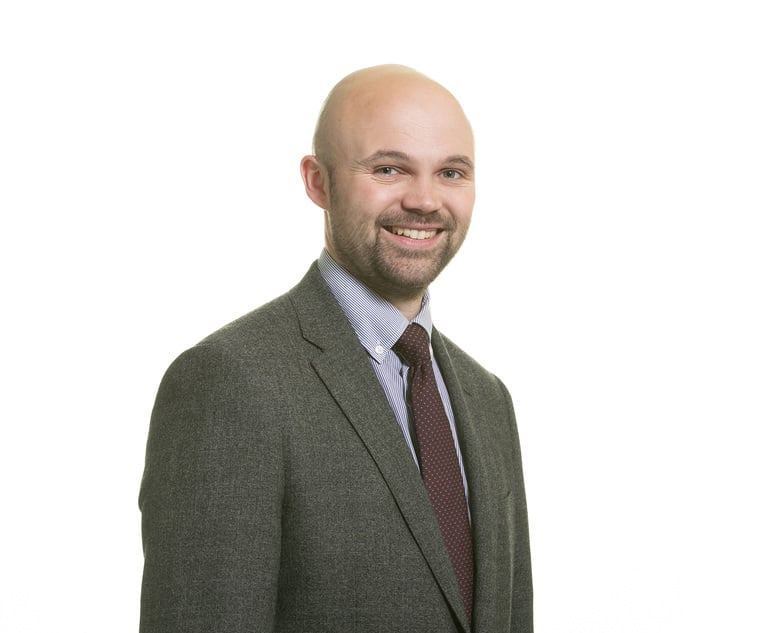Grace Speights Is The American Lawyer's Attorney of the Year
#MeToo was light on corporate culture, and Speights redefined the employment lawyer's role in the movement.
December 05, 2018 at 10:30 PM
4 minute read
 Grace Speights, partner with Morgan, Lewis & Bockius. Photo: Diego Radzinschi.
Grace Speights, partner with Morgan, Lewis & Bockius. Photo: Diego Radzinschi.
Grace Speights, whose labor and employment-focused work in 2018 made her an ally of the #MeToo movement, was named the Attorney of the Year at the American Lawyer Industry Awards on Wednesday night.
Speights' fellow finalists were Bill Deckelman, the general counsel of DXC Technology Co. whose partnership with UnitedLex reimagined how legal departments can work, and David Sanford, the chairman of class action firm Sanford Heisler Sharp who has brought gender bias claims against large law firms on behalf of female partners who felt they were given short shrift.
In accepting the award, Speights said her #MeToo-focused work began from a conversation with Morgan, Lewis & Bockius chair Jami Wintz McKeon.
“She suggested to us that the #MeToo movement presented an opportunity to be a change agent,” Speights said.
During her acceptance speech, she took a moment to thank the clients at the center of her work.
“We could not have done this without the many clients who are willing to engage us to handle some of the most sensitive employment matters they will ever have,” Speights said.
Speights admits that the work she's been doing this year would have seemed like asking for trouble not long ago.
“If a client would have asked most employment defense lawyers whether or not they should do a cultural assessment, the answer probably would have been no,” Speights said earlier this year. “The rationale would be, 'Why are you going out looking for problems?'”
But in the #MeToo era, things have changed.
Speights, head of the labor and employment group at Morgan Lewis, has led a group of lawyers across multiple practices in litigation, investigations and cultural assessments within organizations.
“A lot of people have said to me, 'You're a defense lawyer, you're a management lawyer. … How is it that you can be an ally of the movement?'” Speights said.
But corporations have become more proactive about preventing sexual misconduct rather than covering it up, and they're turning to lawyers such as Speights to identify the problems in their company culture that may allow sexual misconduct to pervade.
“Many employers thought they had safe, inclusive and respectful workplaces, but they did not,” Speights said. “We are an ally of the movement, and it's very different from what we did exclusively many, many years ago.”
Around Christmas 2017, Speights found herself inundated, she said. She had just been hired to conduct a particularly large-scale investigation of the Humane Society, arising from sexual harassment allegations against then-CEO Wayne Pacelle. (He ultimately resigned after Morgan Lewis' report was completed.) So she reached out to firm chairwoman Jami Wintz McKeon.
In a matter of weeks, they formulated a team of about 30 lawyers—all women. About a dozen, mostly labor and employment lawyers, work on #MeToo-related issues full-time, Speights said. They have also called on white-collar, e-data, executive compensation and employee benefits, and governance lawyers.
Speights and her team were behind many of the investigations of the organizations whose #MeToo stories have made headlines in the past year.
They evaluated NPR after allegations of sexual harassment arose against Michael Oreskes, then the senior vice president of news. Oreskes resigned before the investigation was complete, but NPR still publicly released the full findings.
Morgan Lewis also defended the Public Broadcasting Service against on-air personality Tavis Smiley's breach-of-contract suit, after he was terminated for sexual harassment claims.
Law firms, too, have turned to Speights' group to investigate claims of bullying and sexual harassment, Morgan Lewis said.
McKeon contends that not just any longtime employment defense lawyer would be able to help these clients navigate their cultural pitfalls. Speights, she said, earns the trust of both employers and employees, in dealing with matters where tensions run high.
“She brings that judgment and her insight about people to the job she does. She's not coming in there just as a technical scholar or an academic, or someone who can recite what the law is,” McKeon said. “The things she does have a much better chance than almost everybody else at being something everyone can live with.”
This content has been archived. It is available through our partners, LexisNexis® and Bloomberg Law.
To view this content, please continue to their sites.
Not a Lexis Subscriber?
Subscribe Now
Not a Bloomberg Law Subscriber?
Subscribe Now
NOT FOR REPRINT
© 2025 ALM Global, LLC, All Rights Reserved. Request academic re-use from www.copyright.com. All other uses, submit a request to [email protected]. For more information visit Asset & Logo Licensing.
You Might Like
View All
Government Attorneys Face Reassignment, Rescinded Job Offers in First Days of Trump Administration
4 minute read


Trending Stories
- 1Doug Emhoff, Husband of Former VP Harris, Lands at Willkie
- 2LexisNexis Announces Public Availability of Personalized AI Assistant Protégé
- 3Some Thoughts on What It Takes to Connect With Millennial Jurors
- 4Artificial Wisdom or Automated Folly? Practical Considerations for Arbitration Practitioners to Address the AI Conundrum
- 5The New Global M&A Kings All Have Something in Common
Who Got The Work
J. Brugh Lower of Gibbons has entered an appearance for industrial equipment supplier Devco Corporation in a pending trademark infringement lawsuit. The suit, accusing the defendant of selling knock-off Graco products, was filed Dec. 18 in New Jersey District Court by Rivkin Radler on behalf of Graco Inc. and Graco Minnesota. The case, assigned to U.S. District Judge Zahid N. Quraishi, is 3:24-cv-11294, Graco Inc. et al v. Devco Corporation.
Who Got The Work
Rebecca Maller-Stein and Kent A. Yalowitz of Arnold & Porter Kaye Scholer have entered their appearances for Hanaco Venture Capital and its executives, Lior Prosor and David Frankel, in a pending securities lawsuit. The action, filed on Dec. 24 in New York Southern District Court by Zell, Aron & Co. on behalf of Goldeneye Advisors, accuses the defendants of negligently and fraudulently managing the plaintiff's $1 million investment. The case, assigned to U.S. District Judge Vernon S. Broderick, is 1:24-cv-09918, Goldeneye Advisors, LLC v. Hanaco Venture Capital, Ltd. et al.
Who Got The Work
Attorneys from A&O Shearman has stepped in as defense counsel for Toronto-Dominion Bank and other defendants in a pending securities class action. The suit, filed Dec. 11 in New York Southern District Court by Bleichmar Fonti & Auld, accuses the defendants of concealing the bank's 'pervasive' deficiencies in regards to its compliance with the Bank Secrecy Act and the quality of its anti-money laundering controls. The case, assigned to U.S. District Judge Arun Subramanian, is 1:24-cv-09445, Gonzalez v. The Toronto-Dominion Bank et al.
Who Got The Work
Crown Castle International, a Pennsylvania company providing shared communications infrastructure, has turned to Luke D. Wolf of Gordon Rees Scully Mansukhani to fend off a pending breach-of-contract lawsuit. The court action, filed Nov. 25 in Michigan Eastern District Court by Hooper Hathaway PC on behalf of The Town Residences LLC, accuses Crown Castle of failing to transfer approximately $30,000 in utility payments from T-Mobile in breach of a roof-top lease and assignment agreement. The case, assigned to U.S. District Judge Susan K. Declercq, is 2:24-cv-13131, The Town Residences LLC v. T-Mobile US, Inc. et al.
Who Got The Work
Wilfred P. Coronato and Daniel M. Schwartz of McCarter & English have stepped in as defense counsel to Electrolux Home Products Inc. in a pending product liability lawsuit. The court action, filed Nov. 26 in New York Eastern District Court by Poulos Lopiccolo PC and Nagel Rice LLP on behalf of David Stern, alleges that the defendant's refrigerators’ drawers and shelving repeatedly break and fall apart within months after purchase. The case, assigned to U.S. District Judge Joan M. Azrack, is 2:24-cv-08204, Stern v. Electrolux Home Products, Inc.
Featured Firms
Law Offices of Gary Martin Hays & Associates, P.C.
(470) 294-1674
Law Offices of Mark E. Salomone
(857) 444-6468
Smith & Hassler
(713) 739-1250










